The return of the Deposit Return Scheme
Finally, England will have a Deposit Return Scheme
We were promised one many years ago. Over 40 other countries already have one. And now, finally, England will get one… but not until 2025… We’re of course talking about the long-awaited deposit return scheme – the idea of charging a small deposit on packaging to encourage customers to return that packaging and reclaim the deposit. Read on to find out what it means, why we think it needs to go further, and what it will mean when you go to the shops.
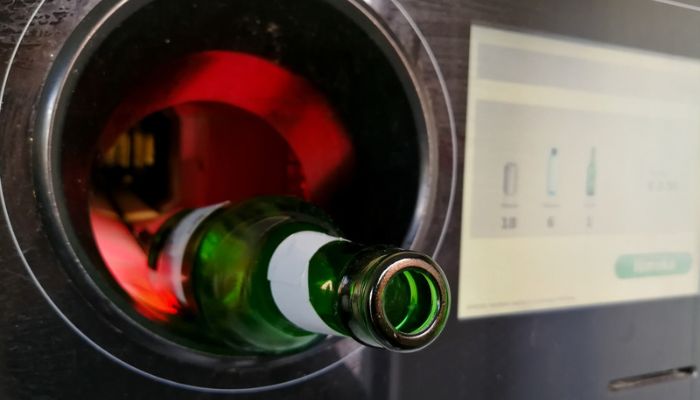
And Englishman, a Scotsman and an Irishman…
This is not joke. We’ve managed to get a different DRS in the 4 different home nations making up the UK.
First of all hat tip to the Scots. Their scheme will go live for consumers on 16 August 2023. This is earlier than the rest of the UK. Another key difference (with England) is that the Scottish DRS will include glass. Zero Waste Scotland estimates this will enable them to recycle over 500 million glass bottles a year saving more than 1.2 million tonnes of Co2 over the coming 25 years. All drinks (both soft and alcoholic) that come in PET plastic, metal and glass. Containers of these material types, sized from 50ml to three litres, inclusive, are part of the scheme.
What’s happening in England, Wales and Northern Ireland?
The new scheme, covering England, Wales and Northern Ireland, is set to be introduced in 2025. It aims to ensure 85% (in Scotland it is 90%) fewer drinks containers are discarded as litter after three years of its launch. Westminster has decided that glass bottles will be excluded from the deposit return scheme in England and Northern Ireland. This means glass will be included in the Welsh scheme. Crystal clear?
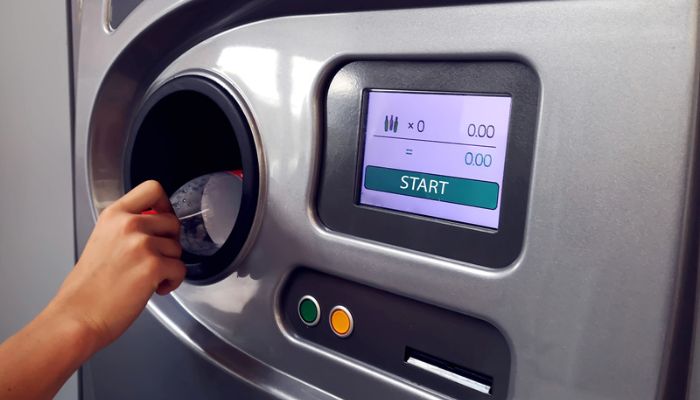
Rewind – what is a DRS?
We’re not fans of jargon at City to Sea so let’s start from scratch – what is a deposit return scheme (DRS)? Simply it’s a way of encouraging more people to recycle drinks containers, such as bottles and cans. In some cases, such as Denmark, they are used to encourage refill and reuse as well as recycling. They work by charging anyone who buys a drink a small deposit for the bottle or can that it comes in. They get this money back when they return the bottle or can to a collection point to be reused or, at least, recycled.
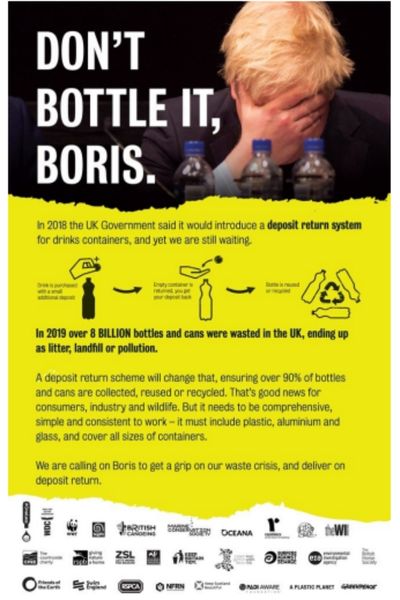
All in, all out, what’s it all about?
You might have heard us talk about an “all in” DRS. So what is this and why does City to Sea want one? An “all-in” Deposit Return Scheme would include aluminium, glass and plastic drinks containers of every size – and would mirror schemes being introduced elsewhere in Great Britain. This makes A LOT of sense to have the same standards throughout the UK.
The government’s own impact assessments and the recent Environmental Audit Committee inquiry also supported this call. In fact, we felt so strongly about this that we joined Keep Britain Tidy in taking out an advert in The Telegraph calling for an all-in DRS.
Sadly, this IS NOT what is being proposed. In England and Northern Ireland they’re excluding glass bottles, while in Wales and Scotland, they’re planning to allow glass. But more on the difference between England, Wales, Scotland, and Northern Ireland later!
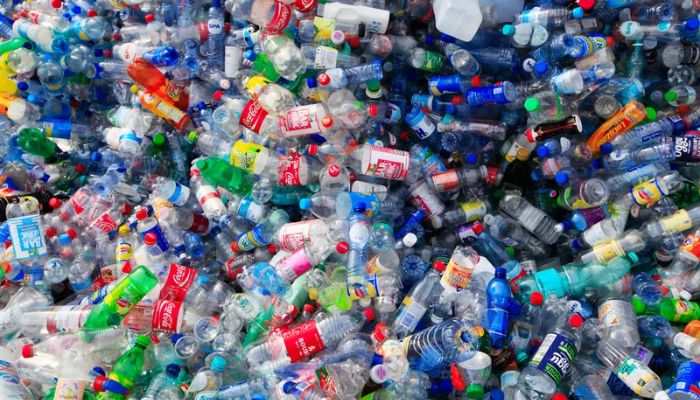
Overflowing with rubbish
But why do we even need a DRS? Well, we are producing more rubbish than our waste system can cope with. We also have a recycling rate that is lower than many of our neighbours. Every year UK consumers go through an estimated around 14 billion plastic drinks bottles and nine billion drinks cans, many of which are littered or condemned to landfill/incineration. Because of the way drinks are consumed, “on the go” when we are out and about, they are also disproportionately littered.
Cost of living crisis
We face a dual crisis – an environmental one and a cost-of-living crisis. Understandably then some have raised concerns about whether a DRS will cost more money.
For consumers the extra money is returnable – so it will only cost more if people do not return their bottles and cans. It also creates an intrinsic value for empty contains which could reduce littering and encourage bottles that have been littered to be collected and returned in exchange for cash.
More widely, a DRS presents opportunities for economic benefit, through reduced impacts of litter, increased material quality and carbon savings. Recyclable materials are worth more money if they are well separated rather than mixed together. This also creates options for recycling the materials into higher quality new products. Cash back!
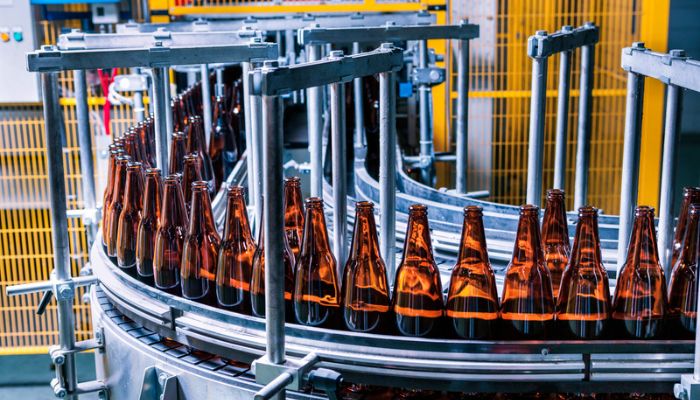
Returning to refill
So, if we return lots of single-use plastic bottles this will be good for recycling. But could a DRS help us to increase the amount of packaging we refill and reuse as well? YES It can. Well, at least the best “all-in” DRSs can and do. Although the current thinking in England or Scotland ISN’T for the DRS to allow for refill or reuse, in many places, they already use a DRS to encourage refill and reuse. For example, in Denmark about a quarter of marked containers are returnable/reusable.
A deposit return scheme opens the logistical opportunities for producers to make the switch to refillable bottles, as the infrastructure is often the same. Imagine how much it easier it is for a company to start using a returnable bottle if, because of a DRS, they’ve already got stuff like; a bottle and can return facilities, trucks and the space to house washing equipment.
Incidentally, this is another BIG argument as to why glass should be included within DRS: to allow the option for producers to switch to refillable glass in future.
‘Flasche’ forward
Our German friends offer a chance to peak into what could be our future as they already operate one of the most effective DRS systems in the world. In Germany, all stores that sell beverages are required to take them back and return the deposit (pfand) to the customer – whether or not that person bought that beverage from them. The deposit for plastic bottles is quite high – €0.25 – in recognition of the higher environmental impact. The deposit for glass bottles is far lower – between €0.08 and €0.15 – because they can be reused. The idea is both to give people more of a reward for returning plastic, and to encourage them to buy products in glass bottles because it’s cheaper up front.
Sehr gut!
Raise the bar
The DRSs coming in across the UK need to be:
- Universal – the same standards need to be applied in England, Wales, Scotland and Wales to make it easy for customers and easy for businesses.
- “All-in” – this means including aluminium, glass and plastic drinks containers of every size.
- Fit for a REFILL future – it should lay the foundations to make it easier and cheaper for businesses to switch to reuse and refill packaging.
If you want to help us raise the bar on this essential piece of legislation write to your MP today asking them to back these 3 points. You can find out who your MP is and how to contact them here.

